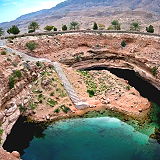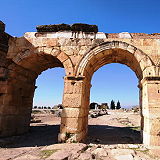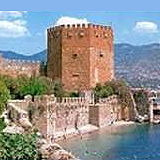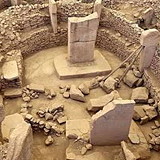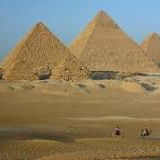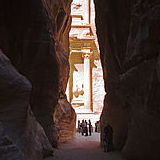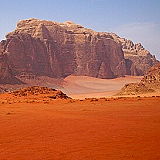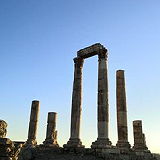| Twin Fairy Chimneys | |
| The Twin Fairy Chimneys, also known as "Peri Bacaları," are a striking geological formation found in Cappadocia, Türkiye. These fairy chimneys are tall, thin spires of rock that have been naturally formed by the erosion of softer volcanic rock. They are a part of Cappadocia's unique landscape, which also includes other rock formations, cave dwellings, and ancient churches. | |
| Lut Desert | |
| The Lut Desert, widely referred to as Dasht-e Lut, is a salt desert located in the provinces of Kerman and Sistan-Baluchestan, Iran. The name is derived from 'Lut' which means bare and empty in Persian and 'dasht' which means plain in Persian. The surface of its sand has been measured at temperatures as high as 70.7 °C (159.3 °F), making it one of the world's driest and hottest places. | |
| Bimmah Sinkhole | |
| Bimmah Sinkhole, also known as Hawiyat Najm, is a stunning natural sinkhole located in Dibab, Oman. It is a popular tourist attraction, known for its clear turquoise water and picturesque surroundings. The sinkhole is believed to have been formed either by a natural collapse of the underground limestone or by a meteorite impact, as the name "Hawiyat Najm" translates to "The Falling Star" in Arabic. | |
| Museum of The Future | |
| Museum of The Future is a landmark devoted to innovative and futuristic ideologies. Located in the Financial District of Dubai, UAE, the Museum of the Future is a torus-shaped building with windows in the form of a poem about the future. | |
| Ephesus Ancient City | |
| Ephesus is one of the largest and most impressive ancient cities in the world and is one of Türkiye’s most significant ancient cities. Its cultural and historical significance was highlighted in its addition to the UNESCO World Heritage Site list in 2015. The remains of the city lie just 80 km inland from the popular seaside city of İzmir and close to the charming towns of Selcuk and Sirince. | |
| Bent Pyramid | |
| The Bent Pyramid is one of the pyramids built by King Sneferu, the first king of the Dynasty 4. It was called “bent” because of its broken lines due to a change of angle, an engineering issue in its design. Indeed, the pyramid construction began at an angle of 55 degrees but had to be adjusted to 43 degrees due to an overload of blocks resulting in instability. | |
| Avenues Mall | |
| The Avenues - Kuwait reflects the ideal image of modern architectural design, as it is at the forefront in terms of space and number of visitors in Kuwait and the region. The Avenues includes 12 districts, inspired by both modern and classic engineering styles namely 1st Avenue, 2nd Avenue, Prestige, Grand Avenue, SoKu, The Mall, The Souk, The Arcades, Grand Plaza, Electra, The Forum, and The Gardens. | |
| Old Doha Port | |
| Formerly known as the Doha Port, the revitalized Mina District has blossomed into an enticing tourist destination in Doha. After four years of extensive renovations, the Old Doha Port now features a striking Grand Terminal building, welcoming impressive cruise vessels during the winter season. | |
| Hierapolis Pamukkale | |
| Hierapolis-Pamukkale is a remarkable archaeological site located in the Pamukkale district of Denizli, Turkey. It is known for its unique combination of natural hot springs, white terraces, and well-preserved ancient ruins. | |
| Red Tower | |
| The Red Tower is an iconic landmark located on the harbor of Alanya, overlooking the Mediterranean Sea. It is part of the city's historic fortifications and offers panoramic views of the surrounding area. The Red Tower was built in the 13th century by the Seljuks, a prominent Turkish dynasty of the time. | |
| Gobeklitepe | |
| Gobeklitepe is an extraordinary archaeological site located in the Haliliye district of ÅŞanlıurfa, in the Southeastern Anatolia Region of Turkey. It is considered one of the most significant archaeological discoveries of our time. | |
| Burj Khalifa | |
| The Burj Khalifa is the tallest building in the world and a global icon. Truly a feat of engineering, the building represents the conceptual heart and soul of the city of Dubai. At 828m tall, this magnificent structure is located next to Dubai Mall and has drawn visitors from all over the world since opening in 2010. | |
| Mortuary Temple of Hatshepsut | |
| The Mortuary Temple of Hatshepsut is one of the most remarkable ancient monuments in Egypt, which surely you will love to visit. The temple was built to honour Queen Hatshepsut, one of the most successful pharaohs in Egyptian history. Located opposite the city of Luxor, it is considered to be a masterpiece of ancient architecture. | |
| Great Pyramid of Giza | |
| The Great Pyramid of Giza, also known as the Pyramid of Khufu, is one of the most famous landmarks in Egypt and the world. It is located in Giza, just outside the city of Cairo, and is the largest of the three pyramids in the Giza pyramid complex. | |
| Al Naslaa | |
| Al Naslaa is a unique geological formation located in the Tayma Oasis of Saudi Arabia. One of its distinctive features is a split sandstone block that stands upright with a clean, straight crack dividing it into two nearly equal parts. The split is so precise that it almost appears as though the rock was deliberately cut with advanced technology. | |
| Al-Siq | |
| Al-Siq is a narrow gorge located in the city of Wadi Musa, Jordan, and serves as the main entrance to the ancient city of Petra. Al-Siq is the primary access point to Petra, leading visitors from the modern city of Wadi Musa to the archaeological site. The path through the Siq is a dramatic and memorable experience, building anticipation as you approach the famous Treasury Al-Khazneh at the end of the gorge. | |
| Fatty Dabs Burger Shack | |
| Fatty Dabs Burger Shack - The skillet's scorching hot surface sears the burger, giving it a perfect crust, and there's just enough fat for that juicy but easy-on-the-stomach flavor. Within minutes, the burger is ready to be served alongside fresh-cut fries. | |
| Wadi Rum Protected Area | |
| Wadi Rum, also known as the Valley of the Moon, is a protected desert wilderness area located in the southern part of Jordan, close to the border with Saudi Arabia. It is part of the larger Wadi Rum Protected Area. It is known for its stunning and unique desert landscapes, red sand dunes, towering sandstone mountains, and ancient petroglyphs. | |
| Royal Tank Museum | |
| The Royal Tank Museum is a national museum with international standards, located in Amman, is considered the first specialized tank museum in the region, displaying more than 150 tanks within a 20,000 sqm. The museum offers a great family experience for Jordanians and visitors of Jordan where they can enjoy the visit and use our interactive story telling exhibition tools. | |
| Amman Citadel | |
| Towering above the capital city of Jordan is the Amman Citadel. This historic site comprises a 1700-meter wall that dates back to the Bronze Age, the iconic Temple of Hercules, and the Umayyad Palace. With so many significant landmarks located in one site, the Amman Citadel is arguably one of the best places to visit in Amman. | |


